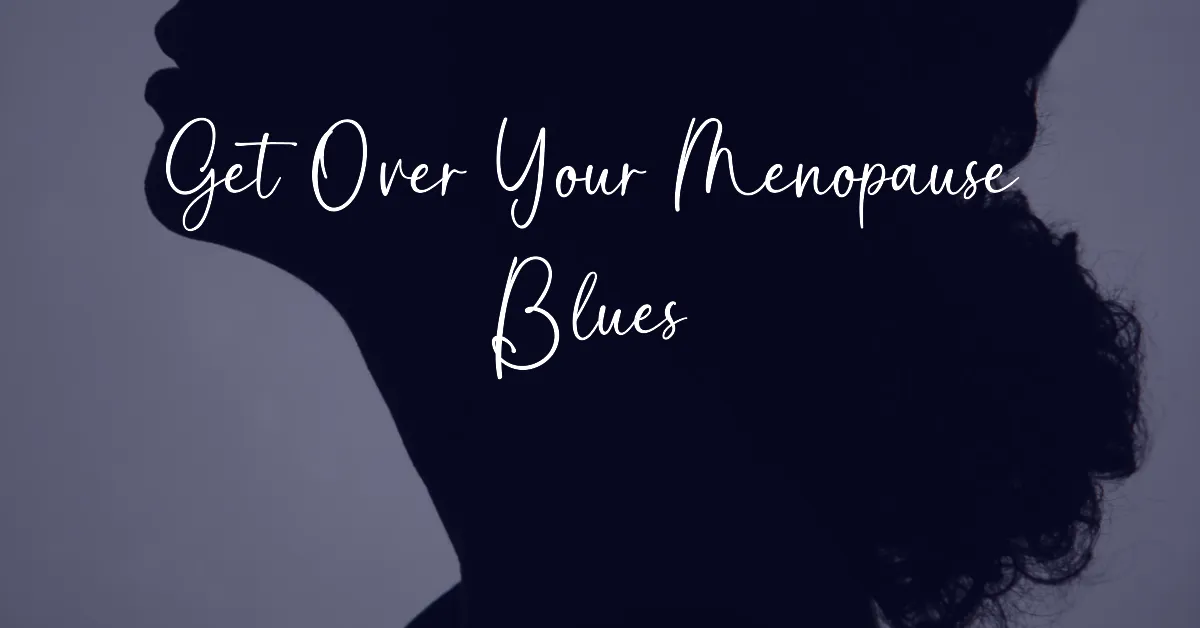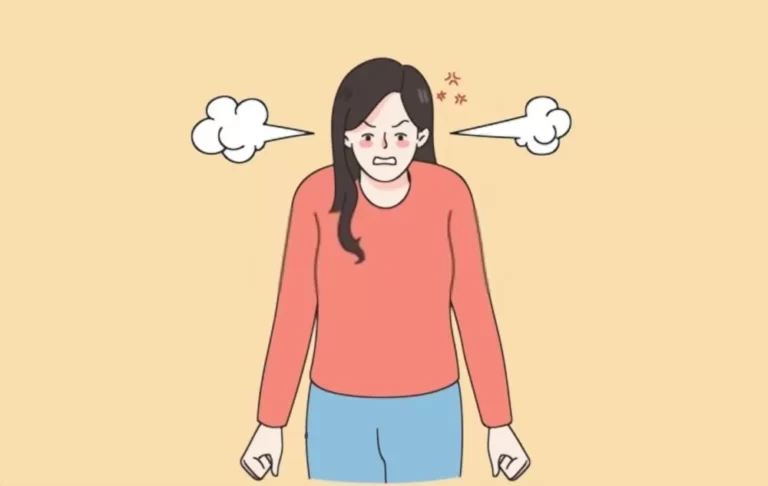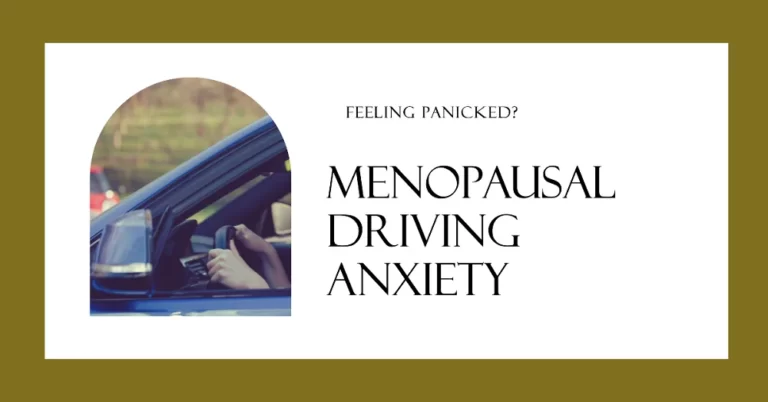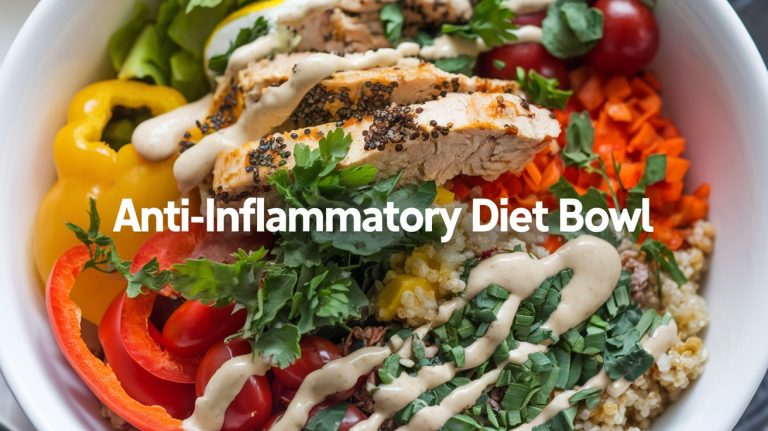How to Fight Depression Naturally During Menopause and Embrace the Beauty of Middle Age?
Middle age can be a beautiful time filled with growth, transition, and new opportunities. But, it can also be a challenge, especially for women going through menopause, along with lifestyle changes like retirement and empty nesting.
This impacts your physical and emotional health in various ways, like depression, anxiety, irritability, mood swings, and decreased libido. Most women in their 50s and beyond suffer from depression, especially those without family and community support.
Don’t lose your heart, though.
As women, we often put our needs on the back burner to care for our loved ones. However, it’s crucial to prioritize our well-being during this transition.
Thousands of women have found joy once again by adopting natural strategies to cope with depression during this season. You don’t have to struggle through this transition.
Let’s explore some natural and empowering ways to find hope and healing so you can embrace this phase of your life with renewed optimism. Discover the power of exercise to boost your mood, learn how simple dietary changes can ease your symptoms, and explore nutritional supplements that will give you the extra support you need.
Finally, find out how to build a supportive and understanding network of family and friends to get the emotional support you need during this season. As we age, we’ll also look at ways to create a meaningful life with purpose and joy.
With the right support and resources, you can find new vitality, self-discovery, and fulfillment in your climacteric years. A positive outlook is essential for thriving in your later years, and we are here to help you get there.
Menopause and Depression Relation
Menopause refers to the stage in a woman’s life when the menstrual cycle stops permanently. Significant hormonal changes occur during this time, leading to several physical and emotional symptoms.
Depression is one such emotional symptom that can arise during menopause.

Symptoms of Uncertainty and Changes
Menopause marks the end of a woman’s reproductive years, which can bring up a variety of emotions, including fear, uncertainty, loss of identity, and feelings of sadness. It is common for women to struggle with accepting this transition as they grapple with changes in their bodies and life.
Women in menopause may experience mood swings ranging from mild irritability to more severe aggression. These mood changes are directly related to the decline in estrogen levels. They can result in anxiety, tearfulness, lack of motivation or energy, lack of focus, disturbed sleep, crying episodes, feeling weepy, panic attacks, and discouraged confidence.
The severity of these symptoms can vary from person to person. But, the ratio of women suffering from depression is much higher in menopause than in any other phase of life.
Along with mood swings and depression, women may experience other uncomfortable symptoms like hot flashes, vaginal dryness, and night sweats. These symptoms can contribute to feelings of irritability and anxiety.
Types
There are different types of depression that women may experience during menopause. These include major depression, which involves persistent sadness, loss of interest, and other severe symptoms that can interfere with daily life.
Dysthymia is a milder form of depression that involves persistent low moods and changes in appetite, sleep, and concentration.
Women may also experience premenstrual dysphoric disorder (PMDD), a severe form of PMS that can cause intense sadness, irritability, and anxiety.
Adjustment disorder with depressed mood can arise in response to significant life changes, such as menopause. This type of depression is usually milder than major depression and typically resolves over time.
Risk Factors
Several factors can increase a woman’s likelihood of experiencing depression during menopause.
- Hormonal Imbalance: During menopause, a woman’s hormones fluctuate drastically. This can lead to physical and emotional changes like fatigue, irritability, mood swings, and depression.
During perimenopause and menopause, there is a significant reduction in estrogen levels, which can impact neurotransmitters in the brain and lead to symptoms of depression.
- Past mental health history: Women who have a history of clinical anxiety and depression, as well as those who have experienced severe premenstrual syndrome (PMS), may be at a higher risk of developing depression during perimenopause and menopause.
- Stressful Life Events: Women who experience changes like caring for elderly parents, managing sickness, or changing employment may find themselves stressed, overwhelmed, and prone to depression.
- Lifestyle Factors: Women’s self-perceived health, exercise habits, and relationships significantly impact their mental health during menopause. Women with unhealthy habits like smoking, lack of exercise, or feeling lonely have been linked to an increased risk of depression during menopause.
- Lack of Support: Many women do not receive adequate support to manage the emotional and psychological symptoms of menopause. The stigma of menopause can make women feel embarrassed or ashamed to talk about their feelings and seek help.
- Medical Conditions: Underlying conditions such as diabetes and thyroid disorders can also increase the risk of depression during menopause. Women with heart disease or cancer and those who have experienced recent trauma may experience heightened feelings of depression during menopause.
What Natural Strategies Can Help to Fight Depression During Menopause?
Adapting to the changes that come with middle age can be difficult, but some simple strategies can make the process easier and more enjoyable. There are many ways to combat the blues of menopause naturally.
Let’s explore some of them so you can embrace this phase of life with renewed optimism.
Boost Workout Frequency and Intensity to Beat Midlife Weight Gain
Starting a well-rounded exercise routine can address menopausal symptoms. Combining moderate and vigorous exercise to achieve your fitness goals and reduce stress and anxiety is important.

Opting for aerobic exercises like swimming, brisk walking, bicycling, and running, as well as resistance or strength training, can help to burn off calories and build muscle mass.
High-intensity interval training is another effective way to get results quickly. It saves time compared to traditional aerobic exercise and can improve cardiovascular health, boost metabolism, and burn more calories.
HIIT involves alternating short, high-intensity intervals with rest periods or low-intensity exercise. This type of training can be performed anywhere, anytime, and easily modified to suit your fitness level.
The Centers for Disease Control and Prevention (CDC) recommend at least 150 minutes of moderate-intensity aerobic weekly for all adults. The recommended amount of aerobic activity per week should be 300 minutes moderate-intensity or 150 minutes vigorous-intensity, along with muscle-strengthening exercises.
Adding a variety of exercises to your routine can help to keep you motivated and prevent boredom. Try incorporating activities such as yoga, Pilates, dance, or group fitness classes, which can be fun and challenging.
Remember to listen to your body; start slowly and gradually increase intensity as your fitness level improves. Consulting a certified fitness trainer or medical professional may also be useful in creating a personalized exercise plan tailored to your individual needs.
Relaxation techniques: Stress can trigger hot flashes and mood swings, so learning relaxation techniques like deep breathing, progressive muscle relaxation, meditation, or yoga can help alleviate these symptoms. A study found that practicing slow, deep breathing for 15 minutes twice daily reduced hot flash frequency by 60%.
Meanwhile, a systematic review of meditation for menopausal symptoms showed that it can improve mood, sleep, and quality of life.
Why Should Exercise be Part of Your Routine?
- Reduces Anxiety and Stress – Exercise is an excellent way to boost your mental health by releasing endorphins. These feel-good chemicals can improve your mood and energy levels while fighting depression.
- Boosts Cognitive Function – Regular physical activity improves blood flow to the brain, leading to the development of new brain cells, better memory, concentration, and focus.
- Helps You Sleep Better – Exercise improves sleep quality and duration, reducing the risk of depression during menopause.
- Reduces the Risk of Chronic Diseases – Regular exercise helps regulate blood sugar, blood pressure, and cholesterol, reducing the risk of developing chronic illnesses such as diabetes, high blood pressure, heart disease, and osteoporosis.
- Connects You with Others – Exercising with friends and family is a great way to have fun and motivate you towards achieving your fitness goals.
Make Eating Patterns Work for You – Eat Well and Keep Portions in Check
As women enter perimenopause, their body composition changes, with more fat settling around the abdomen. So, finding healthy ways to manage stress and reduce anxiety is important.
Be smart with your food choices, stick to your exercise regime, and ensure you are taking the necessary steps to stay healthy. A healthy diet can support the body and mind during this transitional time and help alleviate common symptoms such as mood swings and depression.
Foods to Include for Mood Regulation
Focus on eating real, unprocessed food. The most effective way of a healthy weight during perimenopause is to consume a diet made up of whole, unprocessed foods.
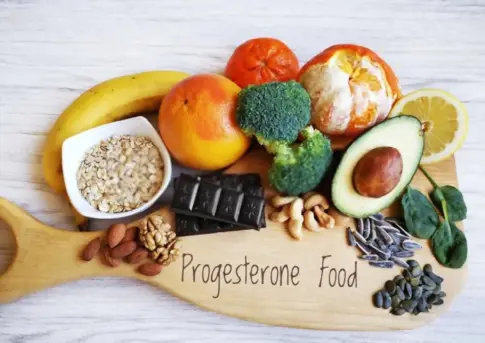
- This means eating plenty of fruits, vegetables, lean proteins, whole grains, and healthy fats. These foods are typically more nutrient-dense, more satiating, and have a lower calorie density than processed foods.
- Barley, wheat, brown rice, bulgur, popcorn, millet, oats, and quinoa are other complex carbs beneficial during menopause.
- Certain foods have been linked to regulating mood and can be particularly beneficial during menopause. These include foods rich in omega-3 fatty acids such as salmon, walnuts, chia seeds, and flaxseed.
- Other mood-boosting foods include dark chocolate, leafy greens, fermented foods, and complex carbohydrates.
- As well as phytoestrogens, which are plant-based compounds that can help to balance hormones naturally. Like, soya beans, flax seeds, and chickpeas are all great sources of phytoestrogens.
- It’s also important to stay hydrated by drinking plenty of water throughout the day to combat fatigue and reduce the risk of dehydration.
Foods to Avoid or Limit
Menopausal women often turn to food as a coping mechanism when stressed. It becomes a vicious cycle as stress eating leads to weight gain, which in turn adds to the stress.
Consuming certain foods can exacerbate menopausal symptoms and should be avoided or limited.
- These include caffeine, alcohol, spicy foods, and foods high in refined sugars and carbohydrates. Excess caffeine and alcohol intake can disrupt sleep patterns and exacerbate hot flashes.
Spicy foods can cause mood swings, while foods high in refined sugars and carbohydrates can trigger cravings.
- Cut back on restaurant meals and takeout. While going out to eat occasionally can be a treat, it’s important to be mindful of portion sizes and the frequency of these meals.
Eating out often leads to consuming more calories than necessary, which can contribute to weight gain. Try ordering appetizers or sharing a meal with a friend to reduce the total calorie intake when dining out.
So, what can I take for menopause depression and curb my food cravings?
Here are some smart tips you can try:
- Smart Snacking: Smart snacking is a great way to control weight gain during menopause. Women can avoid the negative effects of overeating by choosing nutritious snacks instead of unhealthy ones.
Try snacking on crunchy nuts, flavorful seeds, refreshing fruits and vegetables, and tasty soft yogurt. These snacks can provide energy and nutrients without junk food’s added sugar and calories.
Chocolate, yes, you are allowed to indulge in a nibble of dark chocolate here and there. Dark chocolate is an effective option for combating midlife obesity due to its high cocoa solid content, which contains plant-based antioxidants called flavanols.
Flavanols are known for their heart-healthy properties, as they lower blood pressure and improve blood flow to the heart. Additionally, consuming 30 to 60 grams of dark chocolate with at least 70% cocoa content can decrease the risk of heart disease by 50%.
Moreover, dark chocolate can help fight cravings by reducing the body’s ghrelin, the hunger hormone. A study found that participants who consumed dark chocolate in the morning had lower cravings throughout the day.
Dark chocolate is a delicious and healthy addition to a balanced diet when consumed in moderation. It’s recommended to choose high-quality dark chocolate with at least 70% cocoa solids and limit intake to no more than 1 ounce (28 grams) per day.
- Choose Healthy Fats: Contrary to popular belief, not all fats are bad for you. Consuming healthy fats can help counter weight gain. Some examples of healthy fats include avocado, nuts, seeds, olive oil, fatty fish, and coconut oil.
- Portion Control: Portion control is a key principle to combat weight gain during menopause. Rather than having one large meal, it is recommended to break it down into several smaller and more manageable servings.
This approach helps to sustain energy levels for longer periods and regulates any changes in hormone levels that may trigger cravings.
- Mindful Eating: Mindful eating means being aware of one’s body’s hunger cues and eating only when hungry. It means being aware of how much one eats and savoring every bite.
This concept allows for better digestion, leading to less overeating and the consumption of healthy foods that will provide long-lasting energy.
- Beneficial Juice and Teas: Drinking herbal teas and juices can also be beneficial to combat weight gain caused by hormonal changes. Green juice is particularly nutritious and can be consumed as a regular snack or meal replacement.

Herbal teas such as chamomile, peppermint, or lavender can help to calm the nerves and reduce stress levels. Chamomile tea is also known to help improve sleep quality.
- Diet Plan: A personalized diet plan can help to provide the right fuel and nutrients for your body during menopause. A qualified nutritionist or dietitian can advise on the best foods, portion sizes, meal timing, and other nutritional factors to support optimal health and prevent weight gain.
Also, there are a lot of diet plans available online with healthy and balanced meals that women can try to see what works best for them.
Understanding Changing Nutritional Needs
As women age, their nutritional needs change. During menopause, women may need to increase their intake of certain nutrients, such as calcium and vitamin D, to maintain bone health.
It’s also important to focus on anti-inflammatory foods to reduce oxidative stress in the body. Every woman’s nutritional needs are unique, and it can be helpful to consult with a nutritionist or dietitian to develop a personalized plan.
A professional can help identify nutritional deficiencies, recommend specific foods and supplements, and provide guidance on meal planning and preparation.
Sleep Habits That Boost Your Wellness
Sleep helps regulate hormones and appetite and improve mood and emotions. A lack of sleep can lead to irritability, low mood, and even clinical depression.
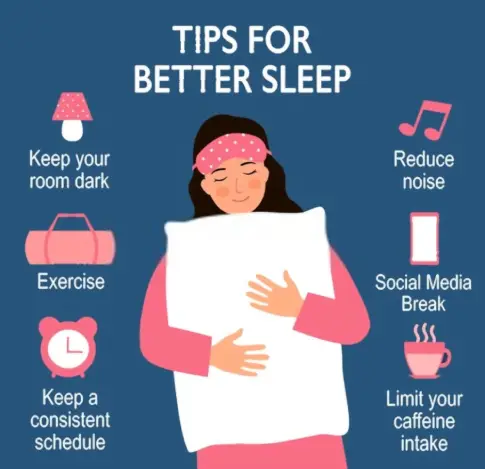
Also, inadequate sleep negatively impacts various aspects of our health, including our hunger hormones. Ghrelin and leptin are two hormones that are crucial for regulating our appetite and metabolism.
The stomach produces ghrelin and stimulates appetite, while leptin is secreted by fat cells and signals the brain when we are full. When we don’t get enough sleep, the levels of these hormones become dysfunctional, leading to an increase in appetite and a decrease in metabolism.
Research shows that sleep-deprived individuals consume more calories, especially carbohydrates and fats, than their well-rested counterparts. This is because their body craves energy-dense foods that provide quick bursts of energy, such as sugary snacks and processed foods.
Moreover, sleep deprivation can also cause insulin resistance, which impairs our body’s ability to use glucose for energy and increases the risk of developing type 2 diabetes. It’s almost a given that getting enough sleep will help you manage food cravings, improve your mental health, and feel better.
Simple Sleep Hygiene Tips
Practicing good sleep hygiene can promote restful sleep. Some tips include:
- Maintain a comfortable sleep environment: A dark, quiet, and cool room can help promote relaxation and better sleep.
- Avoid caffeine, nicotine, and alcohol before bedtime: These substances can interfere with sleep quality.
- Avoid using electronic devices before bedtime, as the blue light emitted by screens can interfere with sleep patterns.
- Exercise regularly: Exercise helps to improve sleep quality and overall health. Try relaxation techniques such as meditation, deep breathing, or reading a book to wind down before sleep.
- Avoid naps during the day: Napping can disrupt sleep patterns at night.
Hormonal Balance
A. Naturopathic Herbal Remedies
While hormone therapy is an option to relieve these symptoms, it carries some risks for cardiovascular disease, stroke, and cancer, particularly in women over 60 years old. Therefore, many women seek natural remedies to alleviate their menopause symptoms.

Black cohosh: This herb is one of the most popular natural remedies for hot flashes and mood swings. It is believed to mimic the effects of estrogen in the body and modulate the levels of neurotransmitters like serotonin.
Studies have shown mixed results on the effectiveness of black cohosh, but it is generally considered safe when taken at recommended doses for up to six months. However, women with liver problems should consult their doctor before using it because of rare reports of liver damage.
Flaxseed and flaxseed oil: These sources of plant-based omega-3 fatty acids and lignans (phytoestrogens) have been shown to reduce the frequency and severity of hot flashes by up to 50%. They can also help with breast tenderness, joint pain, and cholesterol levels.
Flaxseed can be added to smoothies, yogurt, and cereal, while flaxseed oil can be used in dressings and sauces.
Soybean products: Soy contains isoflavones, also plant estrogens that can alleviate hot flashes and night sweats. However, not all women can metabolize isoflavones into equol, the active compound that provides the benefits.
Therefore, soy may not work for everyone. Additionally, soy products should be consumed in moderation as part of a balanced diet, as excess can interfere with thyroid function and nutrient absorption.
Red clover: Like black cohosh, red clover is another herb that contains phytoestrogens that can relieve hot flashes and improve bone density. A study found that women who took a standardized extract of red clover for 12 weeks had fewer and less severe hot flashes than those who took a placebo.
However, it is not recommended for women with a history of breast cancer or blood clots, as it may increase the risk.
St. John’s Wort: This herb is well-known for its antidepressant properties, but it may also benefit women with mild to moderate depression and menopausal mood disturbances. A meta-analysis of 29 randomized controlled trials showed that St. John’s Wort was as effective as prescription antidepressants and had fewer side effects.
But, it can interact with other medications and affect their efficacy, so it’s crucial to consult a healthcare provider before using it.
Saffron: An herb native to Asia, saffron has been used traditionally as an antidepressant. Studies have shown that it can help with symptoms of depression, anxiety, and insomnia in postmenopausal women.
It may also improve cognition and memory and reduce hot flashes. Saffron can be taken in capsule form or brewed as a tea.
Vitamin D: This essential nutrient is crucial for bone health, immune function, and mood regulation. During menopause, women may become deficient in vitamin D due to decreased sunlight exposure and impaired absorption.
Low vitamin D levels have been linked to depression and other mood disorders. Therefore, taking vitamin D supplements at a recommended dose of 600-800 IU daily can help maintain healthy levels and improve mood.
Additionally, spending 15-20 minutes in the sun between 10 am and 3 pm can boost vitamin D synthesis, but remember to use sunscreen to protect your skin.
Other nutrients: B-complex vitamins, folic acid, magnesium, and omega-3 fatty acids are other nutrients that can support menopause health and alleviate symptoms. B vitamins produce serotonin, a neurotransmitter that affects mood and appetite.
Folic acid is essential for proper DNA synthesis and has been shown to reduce the risk of cardiovascular disease. Magnesium is a mineral that helps with muscle relaxation and bone formation and has been shown to improve sleep quality and reduce anxiety.
Finally, omega-3 fatty acids, particularly EPA and DHA, have anti-inflammatory and neuroprotective effects and are important for brain health and cardiovascular function. These nutrients can be obtained through a balanced diet or supplements.
B. Safe Mood-Boosting Supplements
While natural remedies are generally considered safe, it’s important to note that they are not FDA-regulated, and their quality and purity can vary. Therefore, it’s essential to research the manufacturer thoroughly and read reviews from credible sources like Consumer Reports or Consumer Lab.
Supplements with the USP verification mark have also undergone third-party testing for good manufacturing practices and verified ingredients.
Here are some natural mood-boosting supplements for menopause:
NuviaLab Meno: This advanced multi-ingredient food supplement is designed for menopausal women. Its unique composition counteracts symptoms associated with menopause, such as hot flashes, excessive sweating, difficulty sleeping, constant fatigue, irritability, reduced libido, and malaise.
NuviaLab Relax: All people experiencing increased emotional tension and everyday stress will appreciate NuviaLab Relax’s advanced food supplement. Its unique combination of ingredients helps you relax and stay calm during stressful situations and supports the nervous system, the brain, and cognitive functions.
Restilen: This supplement contains ashwagandha, a medicinal herb used in Ayurvedic medicine to reduce anxiety and improve sleep. Boosts energy and vitality, Reduces stress symptoms, Supports the maintenance of a positive mood when dealing with stress
Calm: Herbal stress relief supplement to naturally reduce stress, promote relaxation, and calm the mind.
As with all supplements, it is important to consult your healthcare provider before starting any new regimen. They can help you determine the correct dosage and potential interactions with other medications or pre-existing conditions.
Psychological and Emotional Support
A. Therapy
Cognitive-behavioral therapy (CBT): CBT is a talk therapy that helps individuals change negative thought patterns and behaviors. This therapy aims to identify negative thoughts and replace them with positive ones, which can lead to improved mental health and overall well-being.
Interpersonal therapy (IPT): IPT is a type of therapy that focuses on improving relationships and communication skills. This therapy can be particularly helpful for menopausal women experiencing changes in their relationships due to hormonal fluctuations.
Supportive therapy: Supportive therapy is a type of therapy that provides emotional support and helps individuals develop coping skills to deal with stress and life transitions. This type of therapy is particularly helpful for menopausal women who may feel overwhelmed by the changes they are experiencing.
B. Self-care and Self-compassion
Self-care is particularly important during menopause, as this is a time of significant physical and emotional changes. You can better manage these changes and improve your overall well-being by caring for yourself.
- Engaging in activities that bring you joy and relaxation can help reduce stress and improve your mood. This can include reading, gardening, or taking a yoga class.
- Cultivating self-compassion and positive self-talk can help improve your self-esteem and overall well-being. This can include practices such as daily affirmations or cognitive restructuring exercises.
- Reconnecting with your passions can be a powerful way to improve your overall well-being during menopause. This can include activities such as:
Starting a new hobby or pursuing an old one.
Taking a class or workshop on something that interests you.
Joining a group or club of like-minded individuals.
When to Seek Professional Help?
It can be difficult to know when to seek professional help for menopausal depression or other mental health concerns. Some signs that it may be time to seek help include:
- Persistent feelings of sadness or hopelessness
- Loss of interest in activities you once enjoyed
- Changes in appetite or sleep patterns
- Difficulty concentrating or making decisions
- Thoughts of self-harm or suicide
When seeking professional help, it’s important to find a qualified healthcare professional or therapist with experience working with menopausal women. This can include your primary care physician, a psychiatrist, or a licensed therapist.
If your depression persists or worsens despite trying the above strategies, it’s important to see a doctor for further advice and treatment. Depression is a serious condition that often requires professional help.
Creating a comprehensive treatment plan is key to managing menopause-related depression. This plan may include therapy, medication, self-care practices, and lifestyle changes to support overall well-being.
Working closely with your healthcare team to create a plan that meets your needs and goals is important.
What is menopause’s rage?
Menopause is a natural biological process that ends a woman’s reproductive phase. During this phase, the ovaries produce less estrogen and progesterone, causing hot flashes, night sweats, mood swings, irritability, and depression.
The symptoms can vary from woman to woman based on several factors, like age, genetics, lifestyle choices, and general health.
Having rage or intense frustration can be one of the most challenging symptoms of menopause.
After going through this, a woman can feel helpless, out of control, and ashamed. Menopause rage is not uncommon, as hormonal changes can disrupt the delicate balance of the nervous system and cause a range of emotions that can be hard to control.
Menopausal rage is thought to be caused by hormonal changes, specifically estrogen and progesterone dropping. This shift can cause neurotransmitter imbalance, leading to emotional and cognitive symptoms, including anxiety, depression, irritability, and difficulty concentrating.
Symptoms like these can trigger difficult-to-control bouts of rage.
What is the menopause belly?
Midlife bulge, muffin top, or menopot are all names for menopause belly. Women who go through menopause often notice increased abdominal fat even if they haven’t gained weight elsewhere.
When estrogen drops, the fat tends to accumulate around the midsection.
The lack of estrogen can also lead to insulin resistance, which can exacerbate weight gain and cause other metabolic problems. Even when they follow a healthy diet and exercise routine, women going through menopause might have trouble losing weight.
Unfortunately, the menopause belly is not just an aesthetic issue; it is also linked to an increased risk of health conditions such as heart disease, Type 2 diabetes, and stroke.
Overcoming Your Menopausal Blues for a Meaningful, Joyous Living
Every woman goes through menopause differently. What works for one person might not work for another.
That is why it is essential to take the time to find the right coping strategies and treatments that best suit your individual needs and goals. With the right support, however, menopause can still be a time of growth, purpose, and joy.
Self-care practices such as exercise, a balanced diet, and quality sleep may seem simple, but they play an integral role in supporting physical and mental well-being. By taking proactive steps toward managing your mental health during this transitional period, you can continue leading a meaningful and rewarding life.
Don’t let depression during menopause get the best of you. You are not alone on this journey, and together we can support each other to overcome the challenges that menopause may bring.

